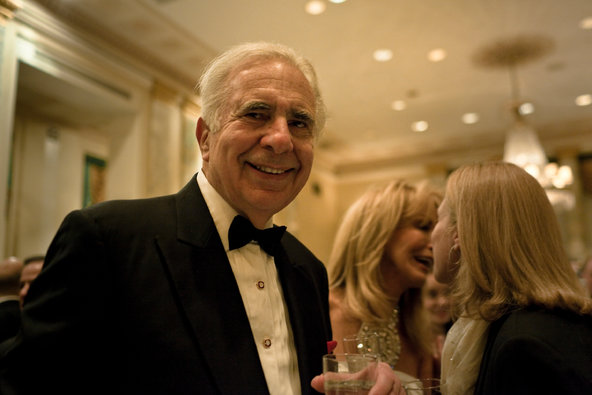 Chad Batka for The New York Times Carl Icahn has suggested a so-called leveraged recapitalization of Dell
Chad Batka for The New York Times Carl Icahn has suggested a so-called leveraged recapitalization of Dell
Dell Inc. has agreed to open its books to the activist investor Carl C. Icahn, signaling a possible truce on one front in the battle over the computer maker’s proposed $24.4 billion buyout.
In exchange, the billionaire — who was critical of the deal just last week — has agreed to confidentiality, which silences, temporarily at least, the influential investor.
In a brief statement on Monday, Mr. Icahn’s firm said that it “looks forward to commencing its review of Dell’s confidential information.”
Related Links
By signing the agreement, Mr. Icahn will formally participate in a “go-shop” process being run by a special committee of Dell’s board. It is meant to flush out offers that could potentially top the $13.65-a-share bid made by the company’s founder, Michael S. Dell, and the investment firm Silver Lake.
Last week, Mr. Icahn appeared poised to join a chorus of opposition to the leveraged buyout proposal. That group already includes two of Dell’s biggest outside shareholders, Southeastern Asset Management and T. Rowe Price. Southeastern and Mr. Icahn have been on the same side in a battle before: Both agitated for change at Chesapeake Energy, and the two eventually won seats on the oil driller’s board.
In recent weeks, Mr. Icahn has built up a stake in Dell that he has described only as “substantial.” The exact size isn’t clear.
On Thursday, Dell’s board disclosed a letter from the activist investor calling for the company to scrap the sale in favor of paying out a special dividend of $9 a share. Such a move, which would be financed by borrowing billions of dollars, is known as a leveraged recapitalization.
If Dell did not comply, Mr. Icahn wrote in the letter, he would consider seeking seats on the board and threatened “years of litigation.”
Advisers to a special committee of Dell’s board met with Mr. Icahn last week, asking him to take part in the go-shop, according to people briefed on the matter. Company directors had wanted the hedge fund manager to provide a concrete alternative to Mr. Dell’s offer.
In early discussions with advisers to the committee, Mr. Icahn floated the idea of buying some of Dell’s shares at a price of about $15 each, these people said. But he later shifted his focus to the special dividend proposal, a move that directors had considered and discarded as inferior to the leveraged buyout.
Shares of Dell rose 1.5 percent on Monday, to $14.37, suggesting that investors believe a higher offer for the company is around the corner. Some analysts and investors have suggested that Mr. Dell and Silver Lake could prevail by improving their bid to $15 a share, something that the two are currently loath to do.
But it is unclear whether, having formally joined the go-shop process, Mr. Icahn will make a firm bid for some or all of Dell. His letter to the board last week offered to provide temporary financing for a special dividend under certain conditions, but did not specify the sources of that money.
A number of other companies have also signed nondisclosure agreements as part of the go-shop process, people briefed on the matter have said. They include Hewlett-Packard, Lenovo and the Blackstone Group.
But people briefed on the process believe that none of those companies will enter a formal proposal, instead seeking to get a rare peek inside Dell’s books.
“The special committee welcomes Carl Icahn and all other interested parties to participate in the ‘go-shop’ process,” the Dell committee said in a statement. “Our goal is to determine if there are alternative transactions that could be superior to the going-private transaction and to secure the best result for Dell’s public shareholders — whether that is the announced transaction or an alternative.”
The go-shop is scheduled to expire on March 22. Afterward, Dell is expected to begin a campaign to counter allegations that the offer from Mr. Dell is too low.
Article source: http://dealbook.nytimes.com/2013/03/11/icahn-signs-confidentiality-agreement-with-dell/?partner=rss&emc=rss